
And the light shines in the darkness, and the darkness did not comprehend it.
Patriarch: Jerusalem Awaiting Peace This Christmas
Affirms That Palestinians and Israelis Are Capable of Living Together
JERUSALEM, DEC. 23, 2007 (Zenit.org).- The patriarch of Jerusalem says that Christians in the holy city will again celebrate Christmas searching for a peace that seems impossible, but with faith that it can be achieved.Archbishop Michel Sabbah affirmed this in a Dec. 19 Christmas message.
"We joyfully celebrate Christmas, hoping to see better days in our Holy Land, by the grace of God, by our own contribution to bring peace to this land and by sharing in all the sacrifices that it requires," the patriarch wrote. "Because God is with us, we remain hopeful in the midst of all the daily difficulties we experience as a result of the occupation and of the insecurity and deprivations that arise from it. God is with us, reminding us that the commandment of love, which was given to us by Jesus, born in Bethlehem, still remains valid for the difficult times in which we are living today."
 The Franciscan Friars of the Custody of the Holy Land and other Catholic clergy await the arrival of the Latin Patriarch of Jerusalem, His Beatitude Michel Sabbah. Note the double barred Patriarchal or Metropolitan Cross.
The Franciscan Friars of the Custody of the Holy Land and other Catholic clergy await the arrival of the Latin Patriarch of Jerusalem, His Beatitude Michel Sabbah. Note the double barred Patriarchal or Metropolitan Cross.

The archbishop called for a love that sees "the image of God in every human being, of every religion and nationality [...] that knows how to forgive and, at the same time, to demand all our rights, especially those given by God to each person and to the entire community, such as the gift of life, of dignity, of freedom, and of the land."
Archbishop Sabbah expressed both dismay at the ongoing conflict, and the faith that peace is possible.
"Palestinians and Israelis are capable of living together in peace, each in their own territory, each enjoying their security, their dignity, and their rights," he affirmed. "But to attain that peace, it is necessary to believe that Israelis and Palestinians are equal in all things, that they have the same rights and the same duties, and that both parties must adopt the ways of God, which are not the ways of violence, whether they be carried out by the state or by extremists."
The Patriarchal Cross is brought out of the Church of the Nativity. The low doors, besides encouraging humility from the pilgrims also prevented the Muslim invaders from riding their horses into the Church.
Turmoil
The patriarch lamented that "the entire region, because of the conflict in the Holy Land, is in turmoil."
He continued: "In Lebanon, in Iraq, as well as here, the forces of evil seem to have been unleashed and to have decided to pursue their course along paths leading to death, exclusion and domination. Despite all of this, we believe that God has not abandoned us to all these forces of evil.
"A new peace effort was begun these last few weeks. In order for it to succeed, there must be a firm willingness to make peace. Until now, there has been no peace, simply because there has been no willingness to make it."
Religious states
Archbishop Sabbah contended that recent proposals to establish "religious states" in the Holy Land do not provide a viable solution.
"In this land, which is holy for three religions and for two peoples, religious states cannot be established because they would exclude or place in an inferior position the believers of the other religions," he said. "A state that would exclude or discriminate against the other religions is not suitable for this land made holy by God for all of humanity.
"Political and religious leaders must begin by understanding the universal vocation of this land in which God has brought us together throughout history. They must know that the holiness of this land does not consist in the exclusion of one or the other of the religions, but in the ability of each religion, with all of their differences, to welcome, respect, and love all who inhabit this land."
 His Beatitude and his auxiliaries are censed as they arrive. The procession then moves towards the Church of the Nativity, through Manger Square.
His Beatitude and his auxiliaries are censed as they arrive. The procession then moves towards the Church of the Nativity, through Manger Square.

Pilgrims
The 74-year-old prelate also appealed for more rights for pilgrims to the Holy Land.
"The holiness and the universal vocation of this land also includes the duty to welcome pilgrims from around the world, those who come for a short visit, and those who come to reside, to pray, to study, or to perform the religious ministry to which the faithful of all religions have a right," he said. "For many years, we have been suffering from a problem that has never been solved, that of entry-visas into the country for priests and for religious men and women who, in this land, because of their faith, have duties to perform as well as rights.
"A state in this land must understand that it must respect and promote the universal vocation of the land with which it has been entrusted and, accordingly, must be open to welcoming all believers of other religions."
Archbishop Sabbah concluded with a prayer that the grace of Christmas "will enlighten all the leaders of this land. For all our faithful, in all parts of our diocese, may the grace of Christmas renew their faith and help them to live it more fully and to better carry out all their duties in their respective societies."
 The entrance leading to the Grotto, under the Greek Orthodox altar, above and the Icon of the Mother of God and the Child Jesus above the entrance, below.
The entrance leading to the Grotto, under the Greek Orthodox altar, above and the Icon of the Mother of God and the Child Jesus above the entrance, below.
Jerusalem Patriarch's Midnight Mass Homily
"Human History Is Full of Wars, But It Is Also Full of God"
JERUSALEM, DEC. 25, 2007 (Zenit.org).- Here is the text of the Christmas Midnight Mass homily of Archbishop Michel Sabbah, patriarch of Jerusalem. The translation was provided by the patriarchate.
* * *
The Midnight Mass is celebrated at the Church of St. Catherine, adjacent to the Church of the Nativity. It begins with the Latin Patriarch carrying the Infant Christ through the Church, above, to the Grotto, next door, below.
Christmas Homily 2007
Brothers and Sisters,
I wish you all a Blessed Christmas.
Mr. President,
1. This holy night, we pray for you, for your difficult task, for the security and unity of the people, and for peace. May God give you light, wisdom and courage. For the leaders of this country, for all the leaders in the Middle East, we pray that God will grant all of them the grace of being able to bring about peace and stability here and throughout the entire region.
2. Brothers and Sisters,
The grace of God has appeared. The Eternal Word of God became man. Saint John tells us in clear terms, whose meaning nevertheless escapes the understanding of many: "In the beginning was the Word, and the Word was with God, and the Word was God" (Jn 1, 1) and "the Word became flesh and made his dwelling among us" (Jn 1, 14). That, my Brothers and Sisters, is the meaning of Christmas, that is what we celebrate, and that is why we rejoice. The prophet Isaiah had predicted: "The people who walked in darkness have seen a great light...a child is born to us, a son is given us; upon his shoulder dominion rests. They name him Wonder-Counselor, God-Hero, Father-Forever, Prince of Peace" (Is 9, 1.5). Saint Leo the Great, commenting on this mystery, said: "Human nature and divine nature were united in one person so that the Creator of time might be born in time, and he through whom all things were made might be brought forth in their midst" (Leo the Great, 2nd reading, Dec. 17).
 Catholic clergy await the arrival of the Patriarch. He places the Infant in the Grotto, above the exact spot of the Nativity and censes the image.
Catholic clergy await the arrival of the Patriarch. He places the Infant in the Grotto, above the exact spot of the Nativity and censes the image. The one through whom all things were made was brought forth in their midst, here in Bethlehem, to fill us with his grace, and to save us from the evil against which we must fight every day. Saint John says: "From his fullness we have all received grace upon grace" (Jn 1, 16). He then says: "No one has ever seen God. The only Son, God, who is at the Father's side, has revealed him." These words tell us that on Christmas, the only begotten Son, who alone knows the Father, who was born here in Bethlehem, born to bring life to men and women, has also enabled us to know God and to enter already here on earth into eternal life. This life is meant to shed light on all our efforts as we try to build our human society and struggle for peace. We have the power to transform all our challenges, joys and suffering into life everlasting, i.e. into a life with God, with his light, his strength and his goodness.
The one through whom all things were made was brought forth in their midst, here in Bethlehem, to fill us with his grace, and to save us from the evil against which we must fight every day. Saint John says: "From his fullness we have all received grace upon grace" (Jn 1, 16). He then says: "No one has ever seen God. The only Son, God, who is at the Father's side, has revealed him." These words tell us that on Christmas, the only begotten Son, who alone knows the Father, who was born here in Bethlehem, born to bring life to men and women, has also enabled us to know God and to enter already here on earth into eternal life. This life is meant to shed light on all our efforts as we try to build our human society and struggle for peace. We have the power to transform all our challenges, joys and suffering into life everlasting, i.e. into a life with God, with his light, his strength and his goodness. Christmas renews us "by the Holy Spirit whom God richly poured out on us through Jesus Christ our savior" (Titus 3, 6), so that in hope we might inherit eternal life. With the strength that comes from this grace, with Christmas present in us every day, we commit ourselves to live in our society in order to bring it the peace of Christmas. Life in this world, with all of its poverty, all of its weaknesses, but also with the strength that comes from grace, must become in us the beginning of eternal life.
3. With this faith in God, with this grace of Christmas, we meditate on the mystery of our land which has not yet succeeded in seeing God within it, and naturally has not succeeded in making peace. With Christmas, with the goodness of God which He himself placed in every human person, it is essential, first of all, to believe that we are capable of making peace. But to do that, we must surpass ourselves and look at the other person through the eyes of God in order to receive justice for ourselves and for the others.
 The Patriarch then re-enters St. Catherine's, which is much larger and more able to accommodate the numerous pilgrims, and the Midnight Mass begins.
The Patriarch then re-enters St. Catherine's, which is much larger and more able to accommodate the numerous pilgrims, and the Midnight Mass begins.It is also important to understand the universal vocation of this land, and to see the will of God for the land both in the Scriptures and in the evolution of history of which the same God is Lord. He is the one who gathered all of us here throughout the centuries, Jews, Christians, Muslims and Druze, we who today constitute two peoples, Palestinians and Israelis. To understand and accept this universal vocation is to accept the plan of God for this land and to become capable of establishing peace within it. Any exclusivism that pushes the other party aside or imposes occupation or any other type of submission on it is not in keeping with the vocation of this land. This land of God cannot be for some a land of life and for others a land of death, exclusion, occupation, or political imprisonment. All those whom God, the Lord of history, has gathered here must be able to find in this land life, dignity and security.
Each one knows what it takes to make peace. Each one knows what is due to each of the two peoples who inhabit this land. It is not up to the weakest to submit themselves and continue to live a life of deprivation; it is up to the strongest, to those who have everything in hand, to detach themselves and to give to the weakest what is due to them. All of the difficult questions can be resolved if all those involved are truly determined to make peace.
4. With all of the religious leaders in this land, we have started to meet and to reflect together. We wanted to ask ourselves, each of us, the question, as believers before God: what is justice before God for each of us? We are on a long and difficult road, because it involves freeing ourselves from the political system, from its exclusive views, and from its fears, in order to enable ourselves to say and to bring something new and good to everyone.
Human history is full of wars, but it is also full of God. And God is love. There should not be any tyranny on the part of some believers, who call themselves believers, but who carry out not the will of God, but their own will, Muslims or Jews or Christians. Some also have recourse to violence in the name of God or of God's promises. Violence cannot claim to be part of any religion. Extremism, in all religions, is the desire to appropriate to oneself, to exclude, and to subject others, not to a faith in God, but to human behaviors that are hostile to the others. Religious leaders have a role to play in the education of believers, by confirming them in the ways of justice, of what is right, and of forgiveness, all the while demanding their rights, and collaborating with all men and women of good will.
5. Brothers and Sisters, you might be asking yourselves what is your role as Christians in the peace process and in the future of this land. Pope Benedict XVI, in his recent encyclical on Hope, says that the characteristic of "Christians is that they have hope, and to have hope is to have a future."
The Gospel is read before Palestinian President Mahmoud Abbas, above.
This applies to us, Christians in the Holy Land and in the entire Middle East. Everyone is worried about our Christian presence here: Israel as well as the Palestinian Authority. King Abdalla II of Jordan has called attention for several years to the seriousness of the exodus of the Christian Arabs. Numerous Muslim voices are being raised in many quarters, calling attention to the vacuum that the exodus of Christians would create in the Arab Muslim world. The Christian world, for its part, is equally worried about our survival and about our disappearance.
To you, Brothers and Sisters, to all of you Christians in this land, you who are tempted to emigrate, you who are the object of everyone's preoccupation, I say to you what Jesus told us: do not be afraid. Christians should not be afraid and should not run away from difficulties. Being Christian means sharing the concerns of all, building peace with everyone else, and accepting the sacrifices this implies, prison, possibly life, or the difficulties of daily life, of occupation, of the wall of separation, and of the lack of freedom of movement. All of this is our common fate, and all of us together, by our sacrifices, we must build peace for everyone.
Another image of the Christ Child, under the altar of St. Catherine's is venerated.
To those who are tempted or pressed by difficulties to leave the country, we say: you have a place here, and more than a place, you have a vocation: to be Christians here, in the land of Jesus, and not elsewhere in the world. Accept your vocation, despite the fact that it is difficult. Our presence here will remain a witness to the universal vocation of this land, the land of God, and the land of the three religions and of the two peoples that inhabit it. Listen to the voice of your vocation, and listen to the voice of all those who want you to be present here.
Indeed, we live not only in the midst of a conflict, but are part of a history of which God is the master, a history made by God who invites us to make this history with Him. He is Lord of the entire history of the human race, since its distant beginnings, since the time of biblical history until today. He is the one who was, who is, and who will be. No person or period in history can avoid Him. He is the inevitable one with whom and before whom we live, act, and exist (cf. Acts 17, 28). Full of hope, free from fear, we continue to move ahead.
 Christmas Morning Mass at St. Catherine's.
Christmas Morning Mass at St. Catherine's.

6. Brothers and Sisters,
I wish you a Blessed Christmas. We pray here this night, here in Bethlehem, for all of you in Palestine, Israel, Jordan, and Cyprus. We pray for all who suffer, for the sick, and for the prisoners so that they can finally enjoy freedom and dignity. We pray for all our leaders so they can envisage justice, enter into the ways of peace, and have the courage to give it to their people. To the entire Christian world, from Bethlehem, we say: have a pleasant and blessed Christmas. Amen.
+ Michel Sabbah, Patriarch
![[Unam Sanctam]](https://blogger.googleusercontent.com/img/b/R29vZ2xl/AVvXsEiymQ2adTjpZ1ABhPBbBBquiPCxeQrc4Jy_97vOikT0wGQeJleriiXQy6ebnb0jrYe-TfvcK77txStB4aIwVAdD41ZdMkVfNtFGC0JX6LBV9B8mfeRZaIAM7Sj-011ag3DiKQzv/s1600/headerdivinemercy.jpg)
























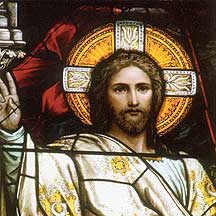







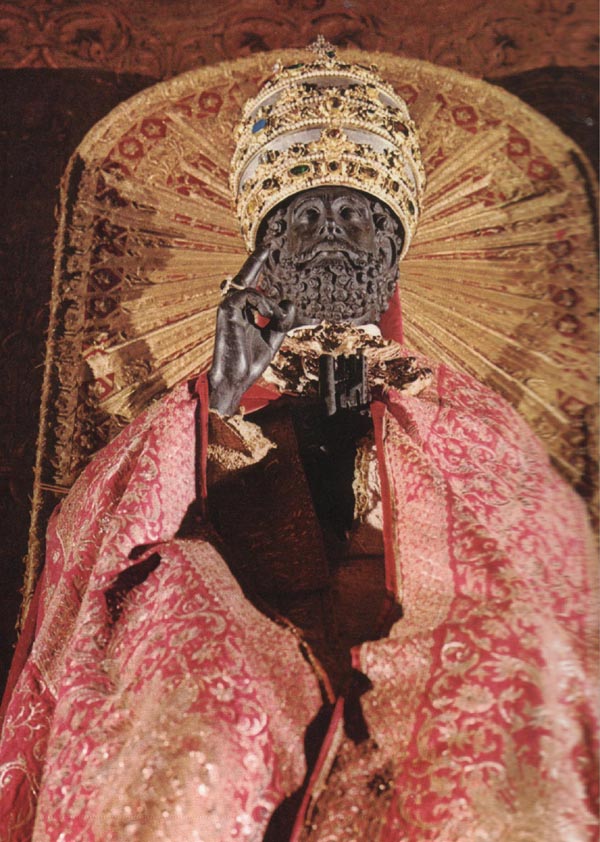
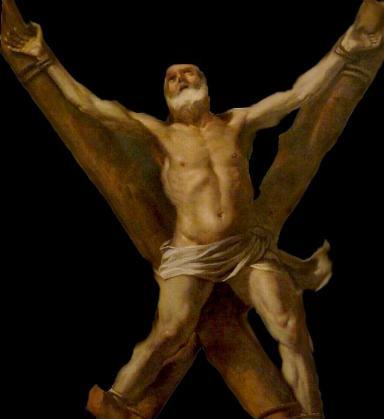




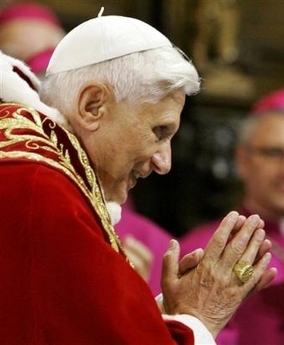






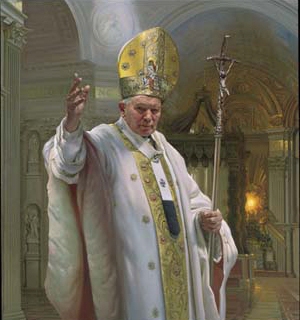
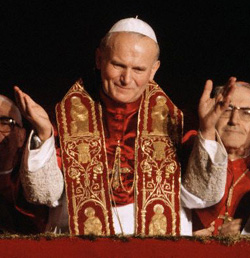
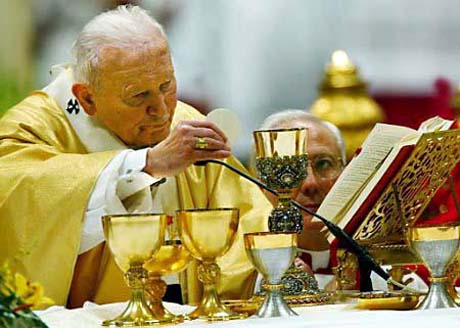







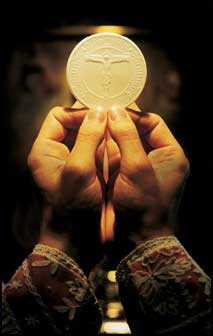
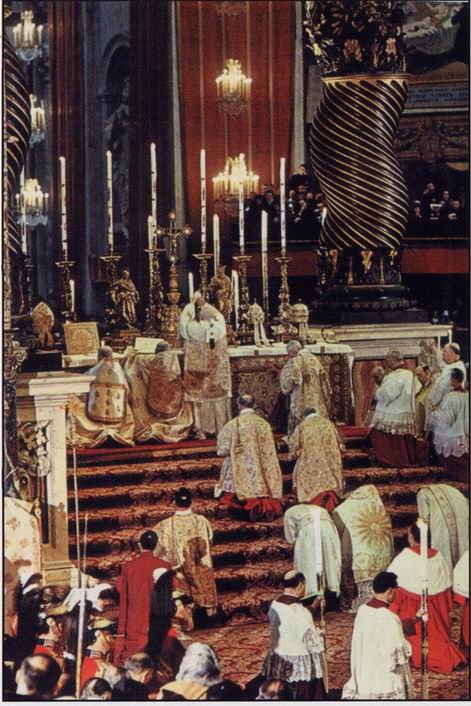

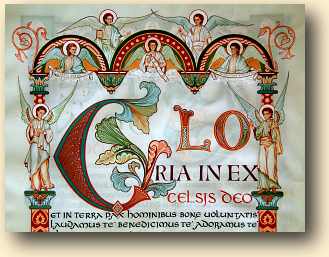

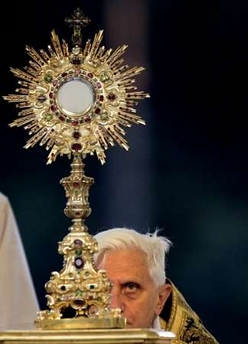


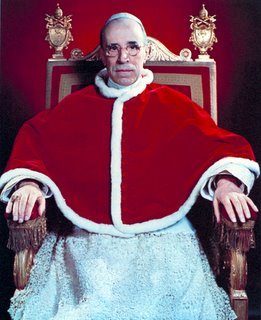




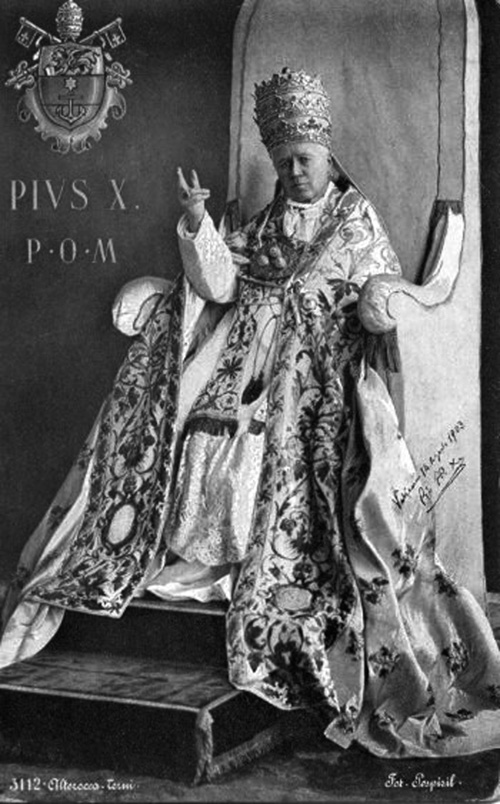



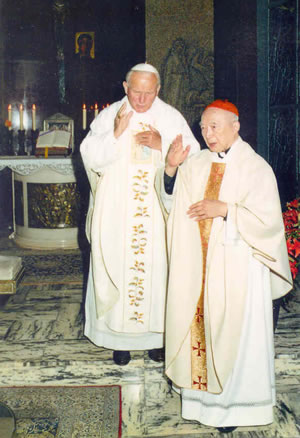





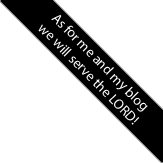
4 comments:
Magnificent post as ever...God bless you Andrew..
Indeed. Its always good to see a blogger putting the Holy Land in the public eye! I'm impressed that the Palestinian President attended Mass, that must have been a difficult decision for him to make, and is an honour the Israeli government would be unlikely to bestow. God bless His Holy Land.
Happy Christmas! What lovely pictures! Well done Andrew! May I please use one on my blog?
great pics ! thanks and happy new year !
Post a Comment